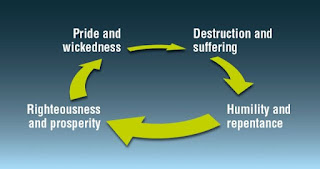Helaman 1-6
"The Rock of Our Redeemer"
Materials: puzzle sheet (printed and cut out), picture of Christ, pictures of cycles (see below)
Opening Song: "Scripture Power" (churchofjesuschrist.org)
Opening Prayer:
Scripture: Helaman 5:12
Attention Activity: Show the images below of different types of cycles: the life cycle and the water cycle. Today we are going to discuss a cycle that we read about in the scriptures and experience in the world around its and in our own attitudes.


Lesson:
In the first part of Helaman and other parts of the Book of Mormon we hear about how the Nephites go through periods of righteousness and wickedness. This is called the pride cycle. When the Nephites were righteous, the Lord blessed them with prosperity and success. Then they would become prideful and wicked. The Lord would then chasten them with hardships, trials, and suffering. When this happened, the Nephites would become humble and repent, asking God to help them. Show the disagram from the Come Follow Me Manual below.
When we talk about pride in the scriptures we are are referring to the sin of being "prideful" which is being selfish, self-centered, and arrogant. This is different from feeling pride for good things like taking "pride in your work" having school pride, being proud of your children, etc.
Read Helaman 3:33–34; 4:11–13. What examples of pride did we read about amounts the Nephites? What do you think happens when people act this way? What are some of the consequences of being prideful? (grow wicked, loose the companionship of the Holy Ghost, endure hardships, suffer, get destroyed)
Refer back to the chart pointing out that as people suffer and endure hardships, they often humble themselves praying to Heavenly Father for relief. They repent of their sins and come back to the Savior. This is one of the reasons Heavenly Father allows bad things to happen to us. But ideally we should not have to keep going through this cycle. A perfect person would not let pride and selfishness enter their hearts after they have been blessed by the Lord. So how do we stop the pride cycle?
In 2010 Elder Uchdorf gave a talk in General Conference called, "Pride and the Priesthood." We are going to learn more about pride by reading some quotes from his talk.
Activity: Picture Puzzle
Before the lesson have the puzzle pieces below cut out and taped to a picture of Christ. Family members will take turns taking off the pieces starting with #1. As they do, discuss each quotation with your family. Some talking points are listed below.

1. People who are prideful are self-centered and they are competitive the point where they can't be happy for other people's success. Have you ever found yourself bragging about your success to others or jealous when someone succeeded where you didn't?
3. Prideful people are often vain. Meaning they focus on how beautiful or handsome they are. They often wear fancy clothes (costly apparel) and focus on material wealth.
4. Pride is the gateway sin because it leads to others sins. Once pride enters your heart and you think you are better than others and deny the existence of God, your loose your moral compass. Pride leads to pretty much every sin that breaks the 10 commandments.
5.One important thing to remember is that we all have moments where we become prideful. Can you think of a time when you were selfish? What was the consequence? Did you feel better after you repented and said you were sorry?
6. The Lord often calls "the little guys" to act as his prophets in the scriptures like Moses and Joseph Smith. Moses wasn't really a good speaker and Joseph Smith hadn't had much schooling. Yet the Lord called them instead of "big shots" because they were humble and meek. He loves and trusts people who are humble.
8. The opposite of pride is humility--not self-consicousness and self-doubt. When we think badly of ourselves, those thoughts come from Satan. He wants us to feel worthless. Heavenly Father wants us to know our divine potential.
So How can I break the pride cycle in myself and in my home? (Point to the picture of Christ that has been uncovered by the puzzle.) Christ is always the perfect example. Christ is God, He is all powerful and yet, He is totally humble. He gives glory to Heavenly Father. He never gloats or flaunts his power. He never let material wealth or position make him greedy and arrogant.
Elder Uchtdorf said, "We must strive to be like the Savior. This means that in all things we seek to do the will of the Father, just as the Savior did. It means that we give all glory to the Father, just as the Savior did. It means that we lose ourselves in the service of others, just as the Savior did." Serving others is the key to avoiding pride. Focusing on the needs and feelings of others, trying to help them, and loving them makes someone more Christlike. When you focus on helping others, you will forget to focus on yourself.
"It is my prayer that we will recognize and root out unrighteous pride in our hearts and that we will replace it with “righteousness, godliness, faith, love, patience, [and] meekness.”
Closing Song: "I'm trying to be like Jesus" (Children's Songbook, 78)
Closing Prayer:
Refreshment: Brown Sugar Peach Cake recipe here



No comments:
Post a Comment